-
 Korea.net's 24-hour YouTube channel
Korea.net's 24-hour YouTube channel- NEWS FOCUS
- ABOUT KOREA
- EVENTS
- RESOURCES
- GOVERNMENT
- ABOUT US
So said Prosecutor Jeong Bo-Young of the Office of Criminal Justice Information Systems.
It is one of Korea’s leading e-government systems that has captured the attention of overseas neighbors like Uzbekistan, Austria, Peru and Mongolia.
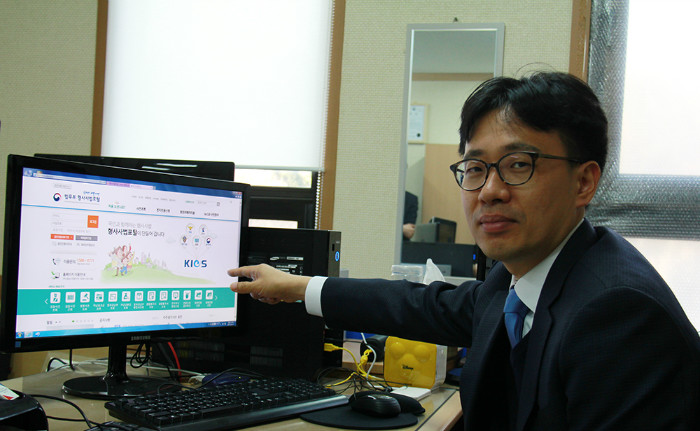
Prosecutor Jeong Bo-Young of the Office of Criminal Justice Information Systems says that KICS is one of the leading cases of 'Government 3.0.'
The system is an automated system backed by IT and covers all aspects of the criminal justice system. It allows other organizations, as well as criminal justice agencies, to share information, as it's connected via mobile communication companies to the immigration office, the Ministry of the Interior and other departments.
Unlike other e-government systems that went with their own online systems, the KICS is the outcome of communication and collaboration between four organizations: the National Police Agency, the Prosecutor’s Office, the courts and the Ministry of Justice.
Despite the differences in opinion due to their vested interests, these organizations worked together and engaged in close communication and negotiation in order to establish a joint information system online.
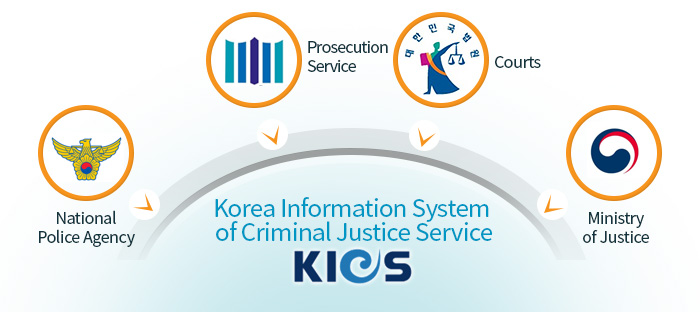
KICS is an inter-agency collaborative administrative system among the four criminal justice agencies: the National Police Agency, the Prosecution Office, the courts and the Ministry of Justice. Through the system, the four organizations can share information and exchange feedback.
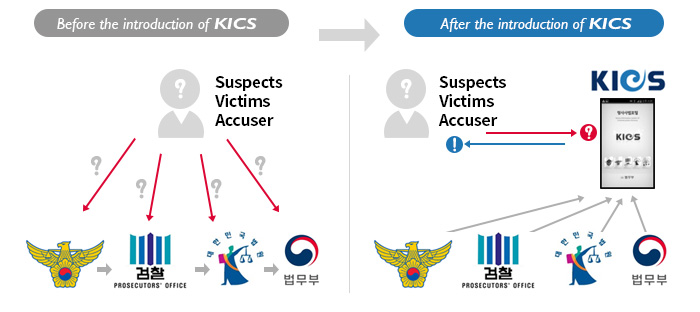
Thanks to the introduction of the KICS, suspects, accusers and victims can learn about the overall development of a criminal case online, and is available in both Android and iPhone operating systems. People can also read and download notices and rulings.
The four criminal justice agencies manage a special server for the KICS. The Office of Criminal Justice Information Systems, under the justice ministry, is in charge of the overall management of the KICS server and inter-agency collaboration affairs.
Korea.net met with Prosecutor Jeong Bo-Young of the Office of Criminal Justice Information Systems to learn more about the KICS and its future goals, and overseas cooperation.
- The KICS may sound strange to many readers. Please explain to us about the "informationization" of the criminal justice system so that our readers can better understand.
The KICS is a comprehensive IT system that helps criminal justice agencies transfer information and the result of criminal cases in a swift, accurate manner, and brings feedback to the citizens in a transparent manner. The KICS was established to boost the "informationization" of the criminal justice system and to enhance promptness and effectiveness of the criminal justice system, which contribute to protecting citizen’s rights.
- The KICS was first introduced in 2010. What led you to develop such a system?
We needed a central system that could serve as a pivot for sharing and using information. Without the KICS, in the past, we had to make documents for every single criminal case and store all the paper work separately. After the 1980s, each of these organizations used an automated, internal system for case management and administration processing procedures, but these systems were run separately, which caused inconveniences and a waste of time when repeating the same paper work. For example, when a criminal case was passed to the prosecution office from the police agency, prosecutors had to manually write all the information about the case, which was already done on paper by the police in the earlier steps. The police weren't able to get the results of the case or receive feedback from the prosecutors. The lack of sharing and using information between agencies caused a waste of workforce. It also led to recording incorrect information during the repeated filing of paper work. It also brought inconveniences for both suspects and accusers, as they had to visit these agencies in person to make enquiries or to complain about the case.
For this reason, the four criminal justice agencies began to work together in 2004. Backed by IT, they cooperated on establishing an inter-agency administration system, the KICS. Thanks to their effort, the KICS was launched in July 2010 as a website.
- What is the biggest benefit that the KICS can bring to the people? Tell us the most significant changes since its introduction.
I would firstly say that the KICS got rid of unnecessary paper works. Once a criminal case is registered in the KICS server, the same documentation work is automatically applied to protocol containing the interrogation of a suspect and criminal facts subject to judgment. In the case of simple criminal cases, such as drunk driving, all criminal justice procedures are digitalized. Now it only takes 10 days to handle such a case, which used to be around 120 days in the past. The KICS also helps us share all the related information, such as the investigation, legal decisions and execution of the law. Thanks to the KICS, suspects, the accused and other involved parties can check how the case is progressing, through their smartphones or anywhere online, which can boost convenience, transparency and trust.
- The protection of personal information is crucial for the KICS. Can you please tell us how the KICS handles cyber security issues?
As we need the highest level of security, we use divided networks for inter-agency affairs and for portal management. The four criminal justice agencies use a special intranet for the public sector, instead of a normal internet connection. Such division is designed to prevent any form of hacking from taking place.
- You've been working with governments in Peru and Uzbekistan regarding the automation of their criminal justice systems. Other countries, like Indonesia and Mongolia, have been using the KICS as a benchmark. What do you think made them take an interest in the KICS?
Korea is the very first country to establish such an online criminal justice integration system. The U.K., for example, began a similar system for all its criminal justice procedures in April last year. Other countries, like Germany, have begun to build similar systems. The KICS wins international attention as it can enhance speed, fairness and transparency of the whole criminal process, ranging from the registration of a criminal case through to the execution of a legal decision.
- What benefit can these countries receive through the introduction of similar systems?
If they adopt a system similar to the KICS, it will firstly save time and money, as it's an automated, digitalized system of all the criminal justice procedures. The citizens will soon realize the convenience of it, which will boost transparency and fairness of the country’s criminal justice system, which, furthermore, will lead to winning the trust of the citizens.
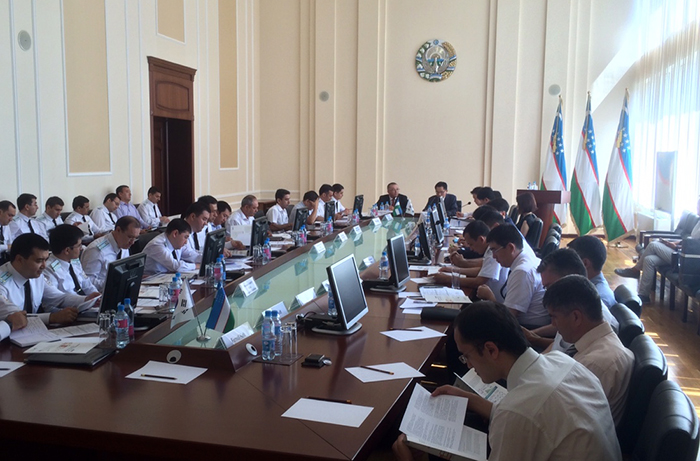
The KICS management office holds a one-on-one forum with Uzbekistani prosecutors during its visit to Tashkent in August 2016, as part of the Korea-Central Asia public administration cooperation forum.
- Every country has different legal systems and different criminal codes. How can the KICS be applied to these countries?
Even though countries have different legal systems, their criminal justice systems have many things in common, in fact. We can share our knowledge, experience and the technology we obtained during the establishment of the KICS.
- Was there any difficulty when it came to overseas cooperation? What did you do to solve any such difficulties?
We should bear in mind that every country has different priorities and faces slightly different circumstances. Government delegations from more than 10 countries visited us last year alone. Some countries put more priority on establishing an internet network and constructing power supply equipment rather than building an online criminal justice system. As such, we recommend they consider any new project as a form of overseas development assistance (ODA), which involves working with the Korea International Cooperation Agency (KOICA) and the Korea Exim Bank.
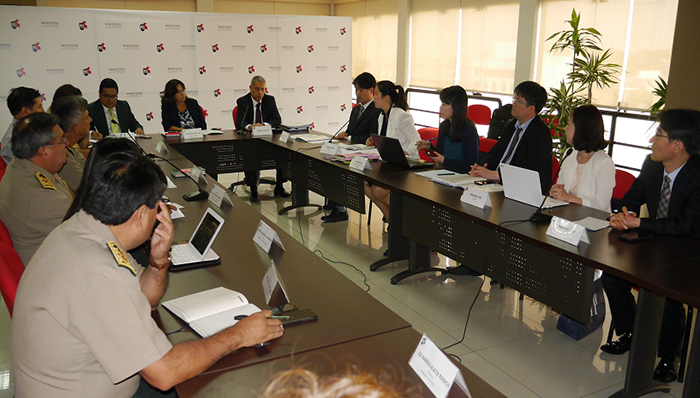
The KICS management team explains the KICS and the modernization of the justice administration system to Peruvian government officials, in Lima during the Korea-Peru e-government cooperation forum in April 2015, on the sidelines of a presidential visit to Peru.
- Tell us about the future direction of overseas cooperation, and any future goals of the KICS.
We have been upgrading our overall KICS system so that it can apply advanced IT, such as big data, artificial intelligence and voice recognition, to criminal justice affairs. When it's completed, we'll be able to greatly boost the ease of use for criminal justice professionals, and serve the citizens better.
Our ultimate goal is to realize a perfect, paperless automation of the criminal justice process. We've already digitalized the case management information sector. Now, we're working on extending the digitalization of evidence-related information, gradually working toward the goal of perfect, paperless automation.
By Yoon Sojung
Korea.net Staff Writer
Photos: Yoon Sojung, Ministry of Justice
arete@korea.kr
Most popular
- First hearing-impaired K-pop act hopes for 'barrier-free world'
- Expats could account for 7% of population in 20 years: report
- 'Mad Max' director impressed by 'cinema-literate' Korean viewers
- Show in Italy to present 'thought-filled' Korean craftworks
- Romanian presidential couple visits national cemetery













